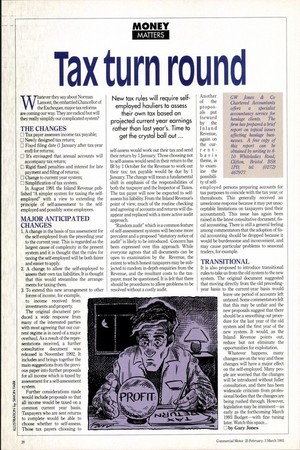Tax turn round New tax rules will require selfemployed hauliers
Page 22

If you've noticed an error in this article please click here to report it so we can fix it.
to assess their own tax based on projected current year earnings rather than last year's. Time to get the crystal ball out ... Whatever they say about Norman Lamont, the embattled Chancellor of the Exchequer, major tax reforms are coming our way. They are radical but will they really simplify our complicated system?
THE CHANGES Tax payer assesses income tax payable; Newly designed tax return; Fixed filing date (1 January after tax-year end) for returns; It's envisaged that annual accounts will accompany tax return; Rigid fixed penalties and interest for late payment and filing of returns; Change to current year system; El Simplification of tax system.
In August 1991 the Inland Revenue published "A simpler system for taxing the selfemployed" with a view to extending the principle of self-assessment to the selfemployed and possibly some employees.
MAJOR ANTICIPATED CHANGES 1. A change in the basis of tax assessment for the self-employed from the preceding year to the current year. This is regarded as the largest cause of complexity in the present system and it is thought that the rules for taxing the self-employed will be both fairer and easier to apply.
2. A change to allow the self-employed to assess their own tax liabilities. It is thought that this would streamline the arrangements for taxing them.
3. To extend this new arrangement to other forms of income, for example, to income received from investments and property The original document produced a wide response from many of the interested parties with most agreeing that our current regime is in need of a major overhaul. As a result of the representations received, a further consultative document was released in November 1992. It includes and brings together the main suggestions from the previous paper into further proposals for all income which is taxed by assessment for a self-assessment system.
Further considerations made would include proposals so that all income would be taxed on a common current year basis. Taxpayers who are sent returns to complete would be able to choose whether to self-assess. Those tax payers choosing to self-assess would work out their tax and send their return by 1 January Those choosing not to self-assess would send in their return to the IR by 1 October for the Revenue to work out their tax: tax payable would be due by 1 January The change will mean a fundamental shift in emphasis of the responsibilities of both the taxpayer and the Inspector of Taxes. The tax payer will now be expected to selfassess his liability From the Inland Revenue's point of view, much of the routine checking and agreeing of accounts and returns will disappear and replaced with a more active audit approach.
"Random audit" which is a common feature of self-assessment systems will become more prevalent and a proposed "statutory notice of audit" is likely to be introduced. Concern has been expressed over this approach. While everyone agrees that all documents can be open to examination by the Revenue, the extent to which honest taxpayers may be subjected to random in-depth enquiries from the Revenue, and the resultant costs to the taxpayer, must be questioned. It is felt that there should be procedures to allow problems to be resolved without a costly audit Another of the proposals put forward by the Inland Revenue, again on the currentbasis theme, is to examine the possibility of selfemployed persons preparing accounts for tax purposes to coincide with the tax year, or thereabouts. This generally received an unwelcome response because it may put unacceptable limitations on taxpayers (and their accountants!). This issue has again been raised in the latest consultative document, fiscal accounting. There is still a general feeling among commentators that the adoption of fiscal accounting should be dropped because it would be burdensome and inconvenient, and may cause particular problems to seasonal traders, for example.
TRANSITIONAL It is also proposed to introduce transitional rules to take us from the old system to the new system. The original document suggested that moving directly from the old precedingyear basis to the current-year basis would leave one period of accounts left untaxed. Some commentators felt that this may be unfair and the new proposals suggest that there should be a smoothing out procedure for the last year of the old system and the first year of the new system. It would, as the Inland Revenue points out, reduce but not eliminate the opportunities for exploitation.
Whatever happens, many changes are on the way and these changes will have a major effect on the self-employed. Many people are worried that the changes will be introduced without fuller consultation, and there has been widescale criticism from professional bodies that the changes are being rushed through. However, legislation may be imminent—as early as the forthcoming March 1993 Budget—with fine tuning later. Watch this space...
by Gary Jones GW Jones & Co Chartered Accountants offers a specialist accountancy service for haulage clients. The firm has prepared a brief report on topical issues affecting haulage businesses. A free copy of this report can be obtained by writing to 810 Whiteladies Road, Clifton, Bristol BS8 1PD, tel: (0272) 467977.












































































